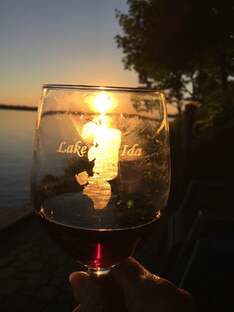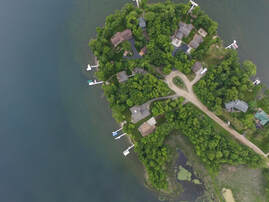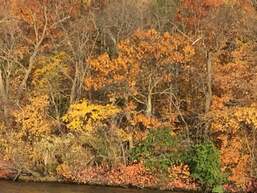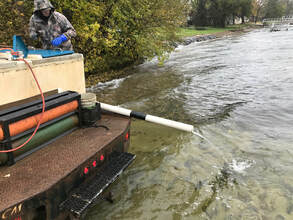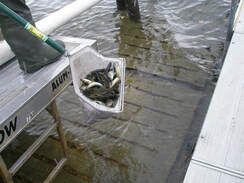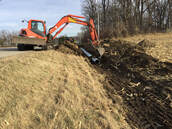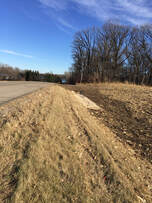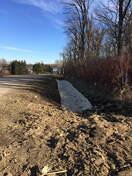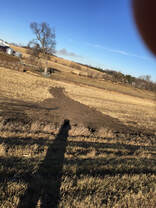Ditch 23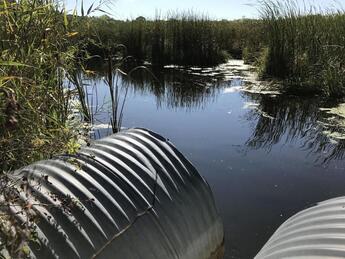 Ditch 23 Ditch 23
For many years, agricultural drainage Ditch number 23 has been carrying significant amounts of phosphorus and other pollutants into Lake Ida. Resolving the problem of the Ditch 23 drainage has been difficult to resolve. As a lake association, ILA cannot and does not do ditch work, so it must work with various county and local government agencies to resolve it. There are three government bodies involved: Douglas County Public Works, The Minnesota Department of Natural Resources, and the Douglas County Soil and Water Conservation District (SWCD). (See the November 2017 article from The Voice of Alexandria for more background on the problem.)
A first step was taken several years ago when SWCD applied for and received a grant from the state for an engineering/feasibility study of the problem. This study recommended a project which is anticipated to decrease the phosphorus entering the lake by 35%, which is significant. In 2020, SWCD applied for and received another grant for the actual construction of the project. These grants from the Minnesota Board of Water and Soil Resources (BWSR) provide 75% of the project cost, and 25% in matching funds has to come from other sources, including ILA. Several years ago, ILA committed $15,000 for the engineering study, but other sources came through with funding, and ILA did not have to contribute any money. For the construction grant, $175,000 in matching funds needs to be raised. At the April 2021 ILA Board of Directors Meeting, ILA committed to contributing $25,000 to this, which is actually only an additional $10,000 to our previous unspent commitment. The Douglas County Water Quality Legacy Fund (WQLF) is a non-profit fund established by SWCD, the Douglas County Lakes Association, the Douglas County Commissioners, and others to collect and manage funds to cover water quality grant matching funds needs. ILA's contribution went toward this fund, which worked to actively raise the additional needed funds for this project. The WQLF has raised all of the funds to cover the 25% matching funds ($175,000) required for the Ditch 23 project, has committed these funds and will disperse the funds to SWCD when requested. Ensuring that Ditch 23 is handled properly and corrected is vital to the health of the lake. ILA has been accumulating money from member dues for years, and now finally ILA has the opportunity to put these funds to work for the quality of the lake. See Ditch 23 Project Summary for graphics and descriptions of the project provided by SWCD. See the Douglas County Water Quality Legacy Fund webpage for more information on the fund or to donate directly to them through their fund manager, West Central Initiative.
|
Curly Leaf Pondweed
ILA has been actively pursuing solutions to reduce the Curly Leaf Pondweed (CLP) invasive species in Lake Ida over the past several years. ILA has contracted to have annual surveys done to identify and delineate where CLP is most prevalent in the lake, and since 2018 we have contracted for an herbicidal treatment of CLP. While the ideal goal would be to eradicate CLP, the size and depth of Lake Ida makes it impossible to fully rid the lake of CLP. ILA hopes to keep the CLP contained to deep water areas where it does not reach the surface and impede the water activities that our residents love. For more information, see our Aquatic Invasive Species page under the LAKE INFO tab.
Walleye Stocking
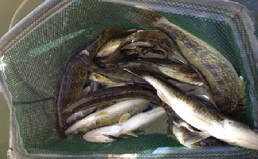 Walleye stocking 2009 Walleye stocking 2009
Due to unavailability of the fingerlings, ILA was unable to stock walleyes in 2016 and 2017. ILA entered a 3-year verbal agreement with a new provider in 2018, committed to stocking 1,000 pounds of walleyes each year at a cost of $16,000 per year, provided the fish and money were available. ILA paid $48,000 over 3 years for walleye stocking from ILA member donations and donations from outside organizations. The DNR stocked an additional 42 pounds of fingerlings in 2020 at no cost to ILA since they had an abundance. They also stocked over 800 pounds of yearlings. The ILA Fish Stocking fund was depleted in 2020. However, ILA has continued to accept donations toward stocking to rebuild the fund and will seek additional sources of funding and fish. ILA has established a Fishing Committee that is looking into new sources for the fingerlings, with a hope to stock again in fall 2022. Recent years' netting survey reports were poor, but local fishermen say the fish are there, but they have gone deeper because of the clarity of the water, so fishing habits need to change to be successful catching them.
|
Organics Recycling
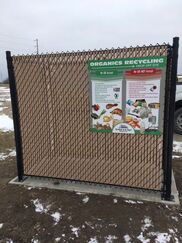
About 38% of what is in the garbage is comprised of organic materials that can be diverted for composting through organics recycling. Items accepted for organics recycling are transferred to a large scale industrial composting site and turned into nutrient-rich compost. When compost is added to soil, it reduces the need for fertilizers and pesticides, and increases water retention, allowing for more efficient use of water. The compost will be used primarily by commercial landscapers, in road construction projects, and in gardens.
Household food waste, including fruit and vegetables, meat and dairy products, eggs and their shells, bread, pasta, rice, beans, nuts, shells, coffee filters and grounds, napkins, paper towels and tissues may be included in your organics composting. Only compostable paper and plastic cups, plates, bowls, utensils, and containers may be included. Look for the BPI or Cedar Grove logos when purchasing these items.
Pope Douglas Solid Waste Management's web page has additional information about the specific types of bags that may be used (NO plastic trash bags), what cannot be included, drop sites, and tips. ILA coordinated with the Ida Township to get permission for an Organics Drop Site at the Ida Township Hall. Pick-up from that site is on Mondays. Feel free to drop your organics on your way in to town! See http://popedouglasrecycle.com/index.php/household/organics-recycling-drop-sites/ for further information.
Household food waste, including fruit and vegetables, meat and dairy products, eggs and their shells, bread, pasta, rice, beans, nuts, shells, coffee filters and grounds, napkins, paper towels and tissues may be included in your organics composting. Only compostable paper and plastic cups, plates, bowls, utensils, and containers may be included. Look for the BPI or Cedar Grove logos when purchasing these items.
Pope Douglas Solid Waste Management's web page has additional information about the specific types of bags that may be used (NO plastic trash bags), what cannot be included, drop sites, and tips. ILA coordinated with the Ida Township to get permission for an Organics Drop Site at the Ida Township Hall. Pick-up from that site is on Mondays. Feel free to drop your organics on your way in to town! See http://popedouglasrecycle.com/index.php/household/organics-recycling-drop-sites/ for further information.

